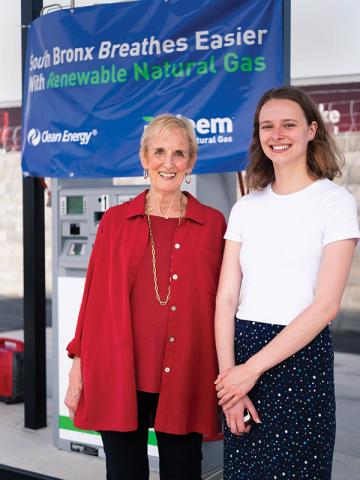Going Green
Two Mawrters share a vision for a sustainable future.
Joanna Underwood ’62 | Political Environmentalism
My introduction to the political environmental movement came in 1968, when I was asked by the Council on Economic Priorities to research the impact of corporate practices on the environment.
Until then, the movement focused on conservation. We took the novel approach of looking at how much companies spent on pollution control, the kinds of equipment used to control it, and the health impacts. We published Paper Profits, a study evaluating how individual pulp and paper companies used the “best available technology”—a guideline that the new EPA used in the early l970s for regulating water pollution.
In 1974, I left the Council to start INFORM, a company focused on determining the best available pollution control technology for industries. In the ’80s, we shifted that focus to strategies to prevent waste and pollution at their source. We are continuing that work at Energy Vision, which I founded to concentrate on ending the world’s dependence on petroleum.
It’s exciting to see the changes since the ’70s. In almost every decade, we learned to ask different questions: First, how to control pollution and improve waste disposal. Then, how to cut waste by recycling. Finally, how to create a truly “green” economy by preventing waste and pollution at the source.
Today, the questions concern the kind of research Sarah worked on this summer—the use of renewable resources and how to stop the production of health-threatening pollutants and greenhouse gases. It requires people who aren’t afraid to dig for information and have confidence in their fact-finding ability—skills you get at Bryn Mawr.
Sarah Golobish ’20 | Political Science
I’m a political science major with an environmental studies/computational methods minor. Finding an area that blends them is hard, but research and advocacy around clean energy fits perfectly and has a positive impact on the world.
I spent this summer interning at Energy Vision, a nonprofit that advocates for sustainability in the transportation sector. I first heard about Energy Vision during a 360° course cluster when the organization’s president (a Haverford alumnus) spoke about its work with anaerobic digestion. Creating energy from waste was a new concept to me and an interesting part of what we studied.
My 360° courses helped me to focus in on my passion for environmental advocacy and, funnily enough, taught me the skills that I used in the internship! My research this summer focused on the sustainability of the largest truck fleets in America, and I learned how efforts to “go green” are hardly as simple as they seem. It was wonderful to work with people who are just as passionate about the environment as I am and who are working to make positive change.
Energy Vision’s relationship to Bryn Mawr is special in that it was founded by Joanna Underwood ’62 in 2007. I met Joanna at the opening of NYC’s first fueling station to exclusively offer renewable natural gas. Over the past 10 years, Energy Vision has advocated for this station and ones just like it across the U.S. that provide a cleaner, low-carbon alternative to diesel.
Published on: 11/20/2019
